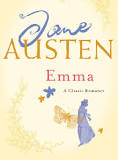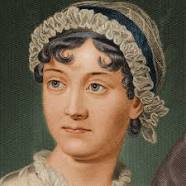Emma Page #40
Emma, by Jane Austen, is a novel about youthful hubris and the perils of misconstrued romance. The story takes place in the fictional village of Highbury and the surrounding estates of Hartfield, Randalls, and Donwell Abbey and involves the relationships among individuals in those locations consisting of "3 or 4 families in a country village". The novel was first published in December 1815 while the author was alive, with its title page listing a publication date of 1816. As in her other novels, Austen explores the concerns and difficulties of genteel women living in Georgian–Regency England; she also creates a lively comedy of manners among her characters and depicts issues of marriage, gender, age, and social status.
Emma's politeness was at hand directly, to say, with smiling interest-- “Have you heard from Miss Fairfax so lately? I am extremely happy. I hope she is well?” “Thank you. You are so kind!” replied the happily deceived aunt, while eagerly hunting for the letter.--“Oh! here it is. I was sure it could not be far off; but I had put my huswife upon it, you see, without being aware, and so it was quite hid, but I had it in my hand so very lately that I was almost sure it must be on the table. I was reading it to Mrs. Cole, and since she went away, I was reading it again to my mother, for it is such a pleasure to her--a letter from Jane--that she can never hear it often enough; so I knew it could not be far off, and here it is, only just under my huswife--and since you are so kind as to wish to hear what she says;--but, first of all, I really must, in justice to Jane, apologise for her writing so short a letter--only two pages you see--hardly two--and in general she fills the whole paper and crosses half. My mother often wonders that I can make it out so well. She often says, when the letter is first opened, 'Well, Hetty, now I think you will be put to it to make out all that checker-work'--don't you, ma'am?--And then I tell her, I am sure she would contrive to make it out herself, if she had nobody to do it for her--every word of it--I am sure she would pore over it till she had made out every word. And, indeed, though my mother's eyes are not so good as they were, she can see amazingly well still, thank God! with the help of spectacles. It is such a blessing! My mother's are really very good indeed. Jane often says, when she is here, 'I am sure, grandmama, you must have had very strong eyes to see as you do--and so much fine work as you have done too!--I only wish my eyes may last me as well.'” All this spoken extremely fast obliged Miss Bates to stop for breath; and Emma said something very civil about the excellence of Miss Fairfax's handwriting. “You are extremely kind,” replied Miss Bates, highly gratified; “you who are such a judge, and write so beautifully yourself. I am sure there is nobody's praise that could give us so much pleasure as Miss Woodhouse's. My mother does not hear; she is a little deaf you know. Ma'am,” addressing her, “do you hear what Miss Woodhouse is so obliging to say about Jane's handwriting?” And Emma had the advantage of hearing her own silly compliment repeated twice over before the good old lady could comprehend it. She was pondering, in the meanwhile, upon the possibility, without seeming very rude, of making her escape from Jane Fairfax's letter, and had almost resolved on hurrying away directly under some slight excuse, when Miss Bates turned to her again and seized her attention. “My mother's deafness is very trifling you see--just nothing at all. By only raising my voice, and saying any thing two or three times over, she is sure to hear; but then she is used to my voice. But it is very remarkable that she should always hear Jane better than she does me. Jane speaks so distinct! However, she will not find her grandmama at all deafer than she was two years ago; which is saying a great deal at my mother's time of life--and it really is full two years, you know, since she was here. We never were so long without seeing her before, and as I was telling Mrs. Cole, we shall hardly know how to make enough of her now.” “Are you expecting Miss Fairfax here soon?” “Oh yes; next week.” “Indeed!--that must be a very great pleasure.” “Thank you. You are very kind. Yes, next week. Every body is so surprized; and every body says the same obliging things. I am sure she will be as happy to see her friends at Highbury, as they can be to see her. Yes, Friday or Saturday; she cannot say which, because Colonel Campbell will be wanting the carriage himself one of those days. So very good of them to send her the whole way! But they always do, you know. Oh yes, Friday or Saturday next. That is what she writes about. That is the reason of her writing out of rule, as we call it; for, in the common course, we should not have heard from her before next Tuesday or Wednesday.” “Yes, so I imagined. I was afraid there could be little chance of my hearing any thing of Miss Fairfax to-day.” “So obliging of you! No, we should not have heard, if it had not been for this particular circumstance, of her being to come here so soon. My mother is so delighted!--for she is to be three months with us at least. Three months, she says so, positively, as I am going to have the pleasure of reading to you. The case is, you see, that the Campbells are going to Ireland. Mrs. Dixon has persuaded her father and mother to come over and see her directly. They had not intended to go over till the summer, but she is so impatient to see them again--for till she married, last October, she was never away from them so much as a week, which must make it very strange to be in different kingdoms, I was going to say, but however different countries, and so she wrote a very urgent letter to her mother--or her father, I declare I do not know which it was, but we shall see presently in Jane's letter--wrote in Mr. Dixon's name as well as her own, to press their coming over directly, and they would give them the meeting in Dublin, and take them back to their country seat, Baly-craig, a beautiful place, I fancy. Jane has heard a great deal of its beauty; from Mr. Dixon, I mean--I do not know that she ever heard about it from any body else; but it was very natural, you know, that he should like to speak of his own place while he was paying his addresses--and as Jane used to be very often walking out with them--for Colonel and Mrs. Campbell were very particular about their daughter's not walking out often with only Mr. Dixon, for which I do not at all blame them; of course she heard every thing he might be telling Miss Campbell about his own home in Ireland; and I think she wrote us word that he had shewn them some drawings of the place, views that he had taken himself. He is a most amiable, charming young man, I believe. Jane was quite longing to go to Ireland, from his account of things.” At this moment, an ingenious and animating suspicion entering Emma's brain with regard to Jane Fairfax, this charming Mr. Dixon, and the not going to Ireland, she said, with the insidious design of farther discovery,
Translation
Translate and read this book in other languages:
Select another language:
- - Select -
- 简体中文 (Chinese - Simplified)
- 繁體中文 (Chinese - Traditional)
- Español (Spanish)
- Esperanto (Esperanto)
- 日本語 (Japanese)
- Português (Portuguese)
- Deutsch (German)
- العربية (Arabic)
- Français (French)
- Русский (Russian)
- ಕನ್ನಡ (Kannada)
- 한국어 (Korean)
- עברית (Hebrew)
- Gaeilge (Irish)
- Українська (Ukrainian)
- اردو (Urdu)
- Magyar (Hungarian)
- मानक हिन्दी (Hindi)
- Indonesia (Indonesian)
- Italiano (Italian)
- தமிழ் (Tamil)
- Türkçe (Turkish)
- తెలుగు (Telugu)
- ภาษาไทย (Thai)
- Tiếng Việt (Vietnamese)
- Čeština (Czech)
- Polski (Polish)
- Bahasa Indonesia (Indonesian)
- Românește (Romanian)
- Nederlands (Dutch)
- Ελληνικά (Greek)
- Latinum (Latin)
- Svenska (Swedish)
- Dansk (Danish)
- Suomi (Finnish)
- فارسی (Persian)
- ייִדיש (Yiddish)
- հայերեն (Armenian)
- Norsk (Norwegian)
- English (English)
Citation
Use the citation below to add this book to your bibliography:
Style:MLAChicagoAPA
"Emma Books." Literature.com. STANDS4 LLC, 2025. Web. 11 Jan. 2025. <https://www.literature.com/book/emma_29>.




Discuss this Emma book with the community:
Report Comment
We're doing our best to make sure our content is useful, accurate and safe.
If by any chance you spot an inappropriate comment while navigating through our website please use this form to let us know, and we'll take care of it shortly.
Attachment
You need to be logged in to favorite.
Log In